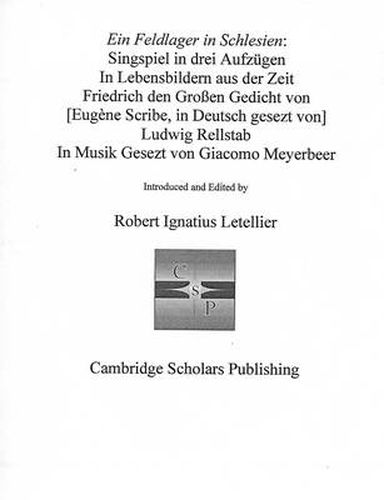Readings Newsletter
Become a Readings Member to make your shopping experience even easier.
Sign in or sign up for free!
You’re not far away from qualifying for FREE standard shipping within Australia
You’ve qualified for FREE standard shipping within Australia
The cart is loading…






Giacomo Meyerbeer returned to his native city of Berlin from Paris in 1842 to take up his new position of Generalmusikdirektor to King Friedrich Wilhelm IV. He was invited to compose a new work for the festive occasion of the reopening of the opera house on 7 December 1844, on a theme celebrating the king’s famous ancestor, Frederick the Great? Eugene Scribe provided the text, in secret, and Ludwig Rellstab translated it. Feldlager was Meyerbeer’s first opera in 30 years on a less serious topic, and using spoken dialogue.-in other words a Singspiel. Especially in the first and third acts, it is possible to see the influence of lighter composers, especially Lortzing and Auber. But much of the second act, especially the tremendous finale, is in the style of the grand operas. Successful as Feldlager was in Berlin with the brilliant Swedish soprano Jenny Lind, Meyerbeer never considered its narrowly patriotic themes suitable for export. Edouard Hanslick pointed out that in no other of Meyerbeer’s works was the German nation so directly engaged, and emphasized the homely, comfortable tone that permeates the music of the score. The overture and much of act 2 was adapted for Meyerbeer’s and Scribe’s opera comique, L'Etoile du Nord (1854). Several melodies have become famous because of Constant Lambert’s adaptation of them for the ballet Les Patineurs (16 February 1937). The fame of the beautiful cantabile melody of the third movement has spread all over the world, and is known to so many who remain ignorant of its true provenance-in the finale of Feldlager, where it accompanies Vielka’s dream-vision and becomes a celebration of peace and the promise of wonderful things to come.
$9.00 standard shipping within Australia
FREE standard shipping within Australia for orders over $100.00
Express & International shipping calculated at checkout
Giacomo Meyerbeer returned to his native city of Berlin from Paris in 1842 to take up his new position of Generalmusikdirektor to King Friedrich Wilhelm IV. He was invited to compose a new work for the festive occasion of the reopening of the opera house on 7 December 1844, on a theme celebrating the king’s famous ancestor, Frederick the Great? Eugene Scribe provided the text, in secret, and Ludwig Rellstab translated it. Feldlager was Meyerbeer’s first opera in 30 years on a less serious topic, and using spoken dialogue.-in other words a Singspiel. Especially in the first and third acts, it is possible to see the influence of lighter composers, especially Lortzing and Auber. But much of the second act, especially the tremendous finale, is in the style of the grand operas. Successful as Feldlager was in Berlin with the brilliant Swedish soprano Jenny Lind, Meyerbeer never considered its narrowly patriotic themes suitable for export. Edouard Hanslick pointed out that in no other of Meyerbeer’s works was the German nation so directly engaged, and emphasized the homely, comfortable tone that permeates the music of the score. The overture and much of act 2 was adapted for Meyerbeer’s and Scribe’s opera comique, L'Etoile du Nord (1854). Several melodies have become famous because of Constant Lambert’s adaptation of them for the ballet Les Patineurs (16 February 1937). The fame of the beautiful cantabile melody of the third movement has spread all over the world, and is known to so many who remain ignorant of its true provenance-in the finale of Feldlager, where it accompanies Vielka’s dream-vision and becomes a celebration of peace and the promise of wonderful things to come.